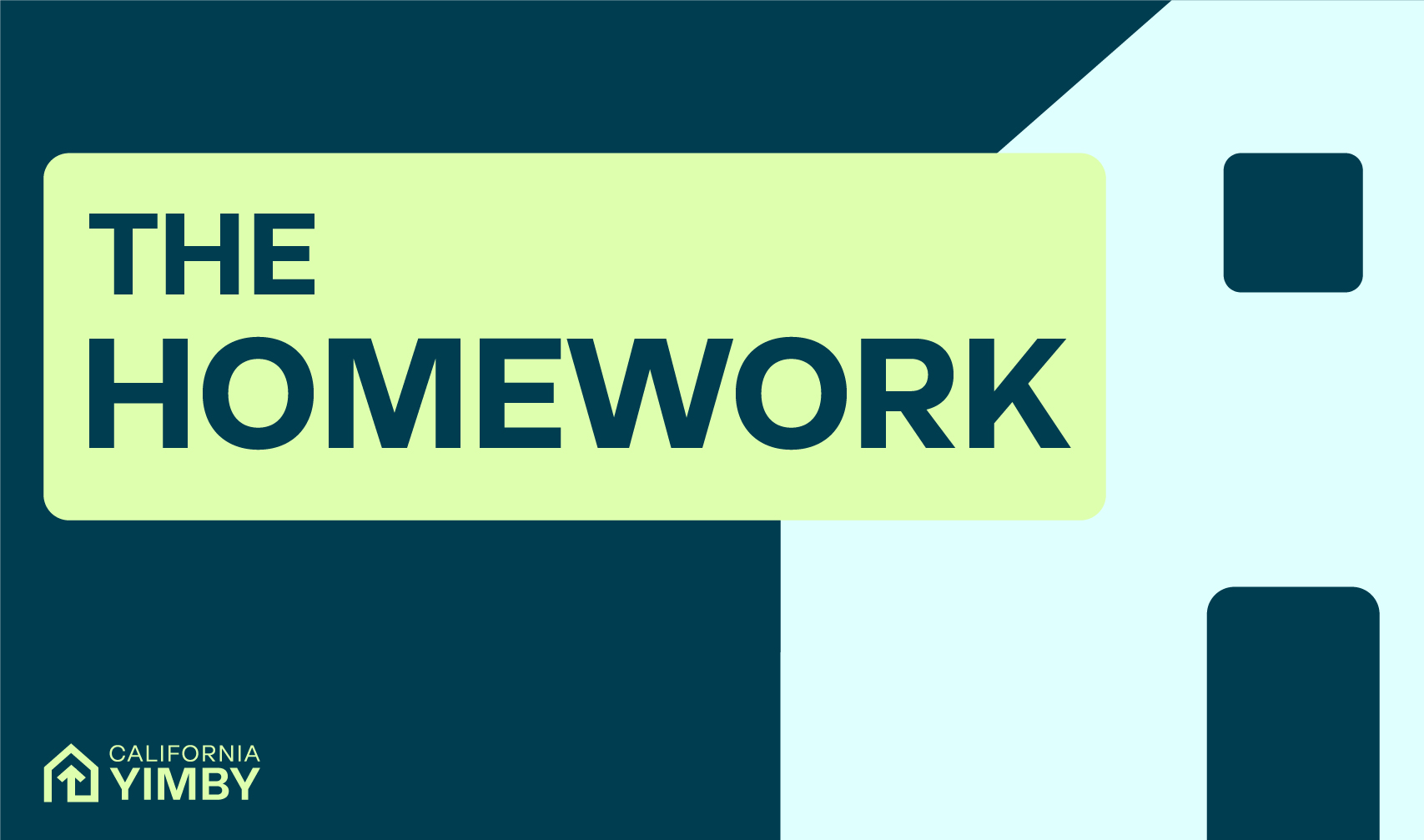The Homework: November 9, 2023

Welcome to the November 9, 2023 Main edition of The Homework, the official newsletter of California YIMBY — legislative updates, news clips, housing research and analysis, and the latest writings from the California YIMBY team.
News from Sacramento
The legislature reconvenes on January 3, 2023; however, leadership from both chambers should be announcing committee assignments before the year ends. Historically, when there is change in leadership, there are also changes on who is going to Chair a committee and which members will be on that committee. We expect a lot of changes!
For those who are tracking two-year bills, January 19, 2023, is the last day for any committees to hear and report to the Floor bills introduced in that house in the odd-numbered year.
We are in the final stages of finalizing our legislative package for the 2024 legislative year, stay tuned!
Housing Research & Analysis
Lot Sizes: When the Bare Minimum is Too Much
Minimum lot size requirements are a common tool used by cities across the United States to ensure that homes are not built on parcels that are deemed aesthetically “too small” for housing. Available evidence suggests that these requirements also drive up housing costs and increase sprawl, by restricting how much land is available for housing in an urban area.
To test the theory that lot size minimums are a barrier to affordability, researchers Joseph Gyourko and Sean McCulloch designed a natural experiment in which they compared house prices on either side of a border between two cities – houses in one city built under strict minimum lot size requirements, and houses in the other city – but in the same neighborhood – built without strict lot size requirements.
Key takeaways:
- Minimum lot sizes are likely a key land use barrier to housing affordability, density, and climate mitigation (due to their relationship to sprawl).
- Larger minimum lot size requirements reduce residential density by 11 percent, and (in the sample) increased house prices by an average of $29,000 over nearby homes in less-regulated jurisdictions – a price difference explained primarily by larger houses and lots.
- Policymakers looking to enhance affordability while addressing climate pollution should consider reducing or eliminating minimum lot sizes.
By-Right Approvals: The Better Part of Housing Valor
Most housing and commercial developments in California cities go through a series of reviews by various government bodies before they are approved for construction, or “entitled” – and those processes differ dramatically.
In many cases, projects are approved “by right” – if a new housing development complies with all applicable laws and regulations, it quickly proceeds to entitlement. But in other cases, cities subject new housing developments to a process known as “discretionary review.” This process typically requires a vote of approval by a public body such as a planning commission or architectural review board, and often results in substantial delays and cost increases for new housing projects.
To understand how much the discretionary review process may delay new housing, compared to “by-right” housing review processes, Michael Manville, Paavo Monkkonen, Nolan Gray, and Shane Phillips of UCLA looked at 350 projects entitled through the City of Los Angeles’s Transit Oriented Communities (TOC) program, which offers a “by-right” entitlement track for some projects.
Key takeaways:
- By-right projects were permitted 28 percent faster than discretionary projects
- Faster approval timelines were accompanied by an increase in average project size and the number of homes reserved for low-income households.
- Policy makers focused on housing affordability should consider more pathways to ensure new projects are subjected to by-right, rather than discretionary approvals
Abundance Podcast: An Interview with Henry Grabar
In Episode 14 of Abundance, California YIMBY research director Nolan Gray chats with Henry Grabar about his new book, Paved Paradise: How Parking Explains the World, including why parking drives people nuts, the curious case of parking privatization in Chicago, and the future of parking reform. Henry is a journalist at Slate, where he writes about cities, and a Loeb Fellow at Harvard University’s Graduate School of Design.
Houser Headlines
- California Wildfire Risks Has State Rewriting Home Insurance Rules – Bloomberg
- As Climate Shocks Grow, Lawmakers Investigate Insurers Fleeing Risky Areas – The New York Times
- California just legalized affordable housing in church parking lots and coastal cities — and it could help solve the state’s crisis
- Housing Developers Cheer State Law to Restrain CEQA Suits
- Editorial: Homeless people need housing everywhere. Including down the street from your house.
- Opinion | Cities try every tool to fix the housing shortage except what works
- California Slams San Francisco for ‘Egregious’ Barriers to Housing Construction – The New York Times
- Column: What a refusal to study turning a freeway into housing says about LA’s future
- Newsom signed over 60 housing bills this year. Here’s how they’re going to change California
- The Housing Crisis: Activist Darrell Owens on Using Social Media to Combat Housing Inequality | Teen Vogue
- White House unveils office-to-residential conversion guidance
- I lost my job at Caltrans for speaking out against a freeway widening. The rot in our transit planning runs deep
YIMBY Social – Top Posts

Share the good word
We welcome your ideas and feedback — send story tips and ideas to Homework@cayimby.org.